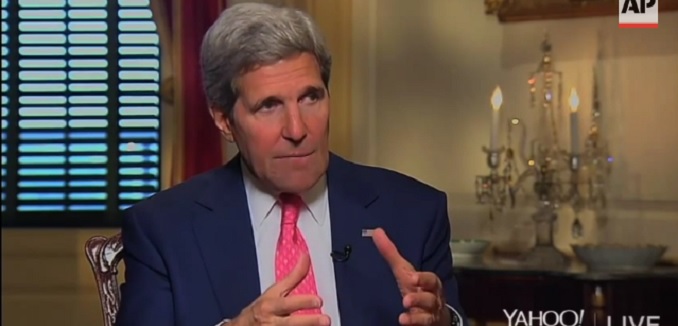A Monday morning interview between Yahoo! News and Secretary of State John Kerry generated a firestorm of controversy – along with a series of retractions and clarifications from various Obama administration officials – after Kerry seemed to imply to interviewer Katie Couric that he was open to cooperating militarily with Iran to halt an ongoing Iraqi offensive by the Islamic State in Iraq and the Levant (ISIS):
QUESTION: Can you see cooperating with Iran militarily?
SECRETARY KERRY: I – at this moment, I think we need to go step by step and see what, in fact, might be a reality, but I wouldn’t rule out anything that would be constructive to providing real stability, a respect for the constitution, a respect for the election process, and a respect for the ability of the Iraqi people to form a government that represents all of the interests of Iraq, not one sectarian group over another. It has to be inclusive, and that has been one of the great problems of the last few years.
His remarks came a few days after murmurs started emerging in corners of the foreign policy community – and more pointedly from the State Department – suggesting that the U.S. might benefit by cooperating with Iran in suppressing ISIS. The policy argument has a long pedigree stretching back to the immediate post-Sept. 11 era, but had fallen out of use after a decade of intelligence revealed that Iran had actively destabilized Iraq and Afghanistan.
More recently the State Department’s 2014 country-by-country terrorism report had assessed that “despite its pledge to support Iraq’s stabilization, Iran trained, funded, and provided guidance to Iraqi Shia militant groups” and further emphasized that Iran was even facilitating the transit of Sunni jihadists.
Nonetheless over the weekend leaks started to emerge that Washington would indeed seek to engage Tehran on sectarian violence in Iraq:
The U.S.-Iran dialogue, which is expected to begin this week, will mark the latest in a rapid move toward rapprochement between Washington and Tehran over the past year. It also comes as the U.S. and other world powers try to reach an agreement with Iran by late July to curb its nuclear program.
The U.S. and Iran have publicly committed in recent days to provide military support if requested to Iraqi Prime Minister Nouri al-Maliki and help his government repel an offensive the Islamic State of Iraq and al-Sham, or ISIS, has launched against Baghdad and other major Iraqi cities over the past week.
Analysts were blunt with their criticism. Washington Institute Managing Director Michael Singh described the move as “misguided” and later expanded that “more Iranian involvement will inflame sectarian tensions,” declaring that the U.S. needed “less Iranian involvement in regional conflicts, not more.”
Brookings Institution Senior Fellow Michael Doran was even harsher, emphasizing on a policy level that U.S. intelligence had linked Iran to ISIS and on a geopolitical level that engagement risked abandoning long-time U.S. allies. The Pentagon quickly and flatly denied the possibility, with Pentagon spokesman Rear Admiral John Kirby telling journalists “there is absolutely no intention and no plan to coordinate military activity between the United States and Iran … there are no plans to have consultations with Iran about military activities in Iraq.”
By the early afternoon State Department Spokesperson Jen Psaki was walking back some of Kerry’s statements:
MS. PSAKI: Mm-hmm. Well, as the Secretary said, we’re open to talking to Iran about the situation in Iraq, just as we’re talking to all of Iraq’s neighboring states. We put out a readout yesterday of a range of calls the Secretary made yesterday to a number of countries in the region. I would remind you that we’ve had similar conversations in the past with Iran regarding Afghanistan. These consultations would be along those lines. We’re not talking about coordinating any military action in Iraq with Iran. We would encourage Iran to push the Iraqis to act to address problems in a nonsectarian way. And the purpose here would be, as I guess I have outlined already, to consult on the situation on the ground, to encourage Iran to play a role if possible in encouraging the Iraqis to act in a responsible, nonsectarian way, and encourage the leaders to do that as well.
By the middle of the afternoon veteran Associated Press diplomatic correspondent Matt Lee dryly noted that while Kerry did not rule out U.S.-Iran military cooperation, “everyone else in Washington does.”
[Photo: Yahoo! News via AP / YouTube]




